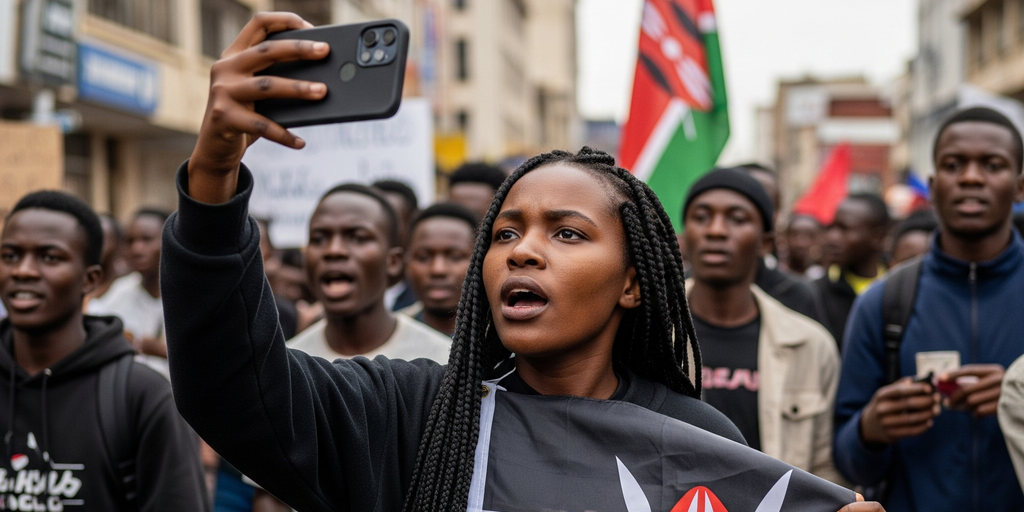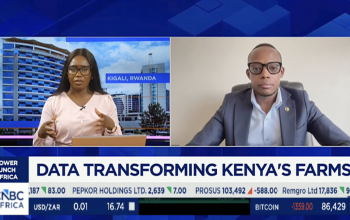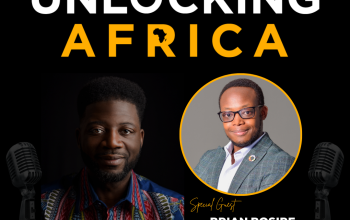BRIAN BOSIRE || THINKER || INNOVATOR || ENTREPRENEUR
From Radios to AI: How 65 Years of Technology Transformed Youth, Protest, and Power in Africa
In the heart of Nairobi, amid clouds of tear gas and chants of “Ruto Must Go,” a young protester holds her phone aloft – not just to record injustice, but to be seen, heard, and possibly… go viral.
Across Africa, the digital generation isn’t just rising; it is redefining governance, activism, and even economics. Today’s protests are not merely acts of resistance – they are also performances in the world’s most powerful marketplace: the attention economy.
Generations and the Tech That Shaped Them
Over the past 65 years, each African generation has encountered its own form of technology – and used it to either challenge power, build economic opportunity, or reshape identity.
- Baby Boomers (1946-64) relied on radio and print media during independence movements. Radio fueled shared consciousness in Ghana’s and Kenya’s anti-colonial struggles. Leaders like Kwame Nkrumah broadcasted political messages that transcended borders.
- Generation X (1965-80) grew up with TV and early satellite media, which brought international solidarity to internal African struggles, like apartheid in South Africa or military regimes in Nigeria. Media coverage became a tool for diplomacy and revolution alike.
- Millennials (1981-96) were shaped by mobile phones and early internet access. In the early 2000s, platforms like blogs and SMS campaigns drove transparency efforts and civic education. This was the generation of fintech pioneers – with Kenya’s M-Pesa revolutionizing mobile money and ushering in crowd funding for courses, and Nigeria’s early digital entrepreneurs building platforms that are now pan-African brands. Some even became millionaires by launching startups that thrived on SMS, social media, and e-commerce.
- Gen Z (1997-2012) is fully digital-native. With TikTok, X (formerly Twitter), and AI tools, this generation moves fast, thinks globally, and acts locally. Their protest movements – #RejectFinanceBill in Kenya, #EndSARS in Nigeria, #ShutItAllDown in Namibia – aren’t just civic uprisings; they’re content strategies, driven by memes, livestreams, drone footage, and viral soundtracks.
Each tweet, reel, and clip isn’t just activism; it’s also economy.
The Fight for Rights—and Reach
What’s happening in Kenya is a microcosm of a broader African awakening. In June 2024, Gen Z mobilized across Kenya against a Finance Bill proposing higher taxes on a population already crippled by joblessness and rising living costs. These weren’t traditional rallies organized by political parties. They were spontaneous, leaderless, tribeless, and online. TikTok influencers, coders, dancers, and community organizers converged, sometimes literally, but often virtually.
By June 2025, protests reignited, this time against police brutality, economic inequality, and governance opacity. Media blackouts failed. The youth adapted using peer-to-peer tools like Zello, VPNs, Telegram, and even AI-generated chatbots to educate citizens on legislation. Some even coded bots that explained the Finance Bill line-by-line.
But underneath the cries for justice lies another reality: attention is income.
For many, each viral post is a potential payday. Protesters gained thousands of followers overnight, leading to brand partnerships, sponsored content, freelance gigs, and content monetization. Platforms like TikTok, YouTube, and Instagram became lifelines – not just for organizing but surviving. In an economy where nearly 70% of youth are underemployed or informally employed, virality can mean rent, food, or fees.
Africa’s young people are not only fighting for their future, they are broadcasting it, and increasingly, banking on it.
Tech as a Mirror – and a Megaphone
This hybrid space – part civic resistance, part digital hustle – is unique to Africa’s youth. While the West debates screen time, African Gen Z is using screen time to speak truth, earn money, and shape governance.
And this isn’t new. Across the continent, technology has long mirrored power structures, sometimes amplifying them, sometimes disrupting them.
- In Tunisia, the Arab Spring was ignited by a viral video and spread through Facebook, toppling regimes.
- In Sudan, protest music and livestreams fueled the revolution that ousted Omar al-Bashir in 2019.
- In Uganda, Bobi Wine used music platforms and digital channels to transform from popstar to presidential candidate.
What has changed now is the scale, speed, and monetization of these movements.
The AI Tipping Point: Threat or Opportunity?
But there is a storm on the horizon. As AI advances across sectors – logistics, content, finance, legal – it threatens to automate away many of the entry-level digital jobs that young Africans rely on: data annotation, content moderation, copywriting, transcription, even social media marketing.
In Kenya, where youth unemployment is already high, this could deepen the crisis.
However, AI also offers new doors:
- Governance tools like FinanceGPT (a chatbot built during the protests) can simplify complex bills, democratizing knowledge.
- Agritech platforms can use AI to guide farmers in real time, boosting yields and creating rural tech jobs.
- Creative economies –from music AI to generative art, could offer Gen Z new monetizable niches.
But without urgent investment in AI education, ethical governance, and inclusive platforms, the risk is high: a digitally-savvy but economically disenfranchised generation, turned into agitators not because they want to but because there’s no choice left.
What African Nations Must Do
To navigate this turbulent but opportunity-rich future, African governments must act decisively:
- Invest in AI and digital literacy: Scale up skilling programs to transition youth from “users” to “builders” of AI and tech.
- Fund youth innovation hubs: Support platforms that incubate African-designed solutions. From civic tech to climate tools.
- Safeguard digital rights: Build legislation that protects speech, data, and access, so that protest isn’t punished with surveillance.
- Link attention to employment: Create formal pathways from content creation into stable careers, through regulation, microgrants, and creator economy incentives.
- Involve youth in governance: Not just token representation, but real co-design of national policies through youth assemblies, online parliaments, and civic tech platforms.
The Algorithm is Watching
The streets are filled not just with chants, but with camera flashes and livestreams. In Africa today, the future of governance is being negotiated on smartphones as much as in parliaments. Youth are not just the demographic majority, they are the algorithmic vanguard. They code. They dance. They protest. And they monetize it all.
Whether they are reshaping laws, challenging presidents, or going viral in the process. They’re asking not only for justice, but for a seat at the table, a job in the new economy, and a share in the digital wealth of the continent they are reinventing in real-time.
And in a world where attention equals capital, Africa’s youth are demanding more than likes.
They’re demanding power.
Article by Brian Bosire, A Technology Entrepreneur, passionate about solving most pressing challenges in Africa.



